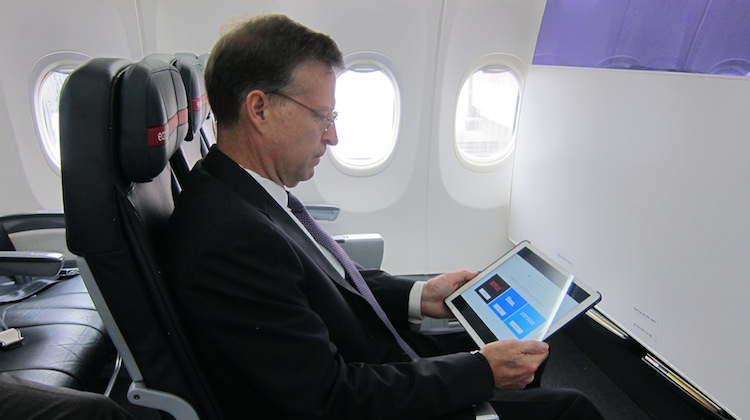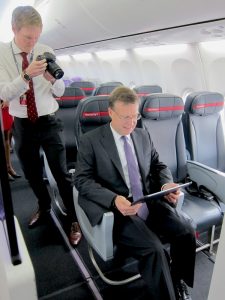
Virgin Australia plans to commence a three-month inflight internet wifi trial on board a Boeing 737-800 from mid-April after naming Gogo and Optus as its technology partners for the service.
The airline plans to utilise the 2Ku technology from Optus for domestic and New Zealand flights, with Intelsat and SES for its other international flights, Virgin said on Thursday.
The aircraft, VH-YIG, has been fitted with the necessary hardware and some internal testing is being undertaken ahead of the service being opened up to the public.
Virgin has signed up Netflix, Stan and Pandora for streaming content for its wifi service.
While internet wifi and streaming content from its content partners will be free for passengers during the trial, the airline said it would “finalise its business model after considering customer feedback and the results of the testing period”.
“That’s actually part of the feedback that we want to get through the process,” Virgin Australia group executive for airlines John Thomas told reporters in Sydney on Thursday.
“I would imagine that what we will see is there will be something if you want to stream videos, there will be something if you just want to use email, there will be something if you want to do texting.”
“It’s about giving people choice.”

Thomas said there was also consideration of passengers getting internet wifi access for free based on the cabin they were sitting in or their frequent flyer status.
Virgin first announced plans to equip its fleet of Boeing 737-800s, Airbus A330-200s and Boeing 777-300ER fleet with inflight internet wifi in July 2016.
Since that first announcement, Thomas said the airline has been evaluating the potential suppliers of the technology in terms of the proven technology and highest level of reliability.
“Gogo has that track record,” Thomas said, noting Gogo had about 150 737s offering internet wifi with its product.
“If you look at the experience in the US and for all of the carriers around the world that do have connectivity, speed really isn’t the issue, the issue here is reliability.”
“People get very upset if the product isn’t reliable.”
The full rollout of the hardware across the fleet would take about 12 months, Thomas said.
Gogo said in early March about 3,000 commercial aircraft and 4,200 business jets were fitted with its internet connectivity technology. Further, about 130 of the 3,000 commercial aircraft had Gogo’s 2Ku technology that leverages its global satellite network.
“2Ku delivers a ground-like performance to aircraft flying around the world today, including the ability to stream video,” Gogo chief executive Michael Small said in a statement.
“Importantly, 2Ku is built on an open architecture and can leverage new technology advancements in the future, which means the technology can provide passengers with a superior connectivity experience now and in the future.”
Optus Satellite Vice President, Paul Sheridan, said: “We welcome the opportunity to provide dedicated satellite capacity to support Virgin Australia and Gogo in the delivery of a premier in-flight customer experience.”
Virgin is among the three major carriers in Oceania preparing to offer inflight internet wifi.
Air New Zealand announced in October its international and domestic jet fleet would be progressively equipped with wi-fi from 2017 utilising the Inmarsat new global GX satellite constellation. Trials were scheduled for the second half of 2017 on a new Airbus A321neo and refitted Boeing 777-300ER.
Meanwhile, Qantas recently delayed the start of its internet wifi service, provided by ViaSat’s global satellite network and the National Broadband Network’s Sky Muster satellites on the Ka band, due to what the airline said were “stability issues”.
(Read more about the connectivity challenge for airlines offering inflight internet wifi in the January-February 2017 edition of Australian Aviation magazine.




